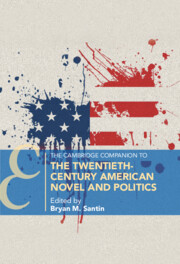Book contents
- The Cambridge Companion to the Twentieth-Century American Novel and Politics
- The Cambridge Companion to the Twentieth-Century American Novel and Politics
- Copyright page
- Dedication
- Contents
- Chronology
- Introduction
- Part I Ideologies and Movements
- Part II The Politics of Genre and Form
- Part III Case Studies
- Chapter 15 Herland (1915): Charlotte Perkins Gilman
- Chapter 16 It Can’t Happen Here (1935): Sinclair Lewis
- Chapter 17 All the King’s Men (1946): Robert Penn Warren
- Chapter 18 Invisible Man (1952): Ralph Ellison
- Chapter 19 The Left Hand of Darkness (1969): Ursula K. Le Guin
- Chapter 20 If Beale Street Could Talk (1974): James Baldwin
- Chapter 21 The Monkey Wrench Gang (1975): Edward Abbey
- Chapter 22 Ceremony (1977): Leslie Marmon Silko
- Chapter 23 Parable Series (1993, 1998): Octavia E. Butler
- Chapter 24 The Underground Railroad (2016): Colson Whitehead
- Further Reading
- Index
- Cambridge Companions To …
Chapter 21 - The Monkey Wrench Gang (1975): Edward Abbey
from Part III - Case Studies
Published online by Cambridge University Press: 07 October 2023
- The Cambridge Companion to the Twentieth-Century American Novel and Politics
- The Cambridge Companion to the Twentieth-Century American Novel and Politics
- Copyright page
- Dedication
- Contents
- Chronology
- Introduction
- Part I Ideologies and Movements
- Part II The Politics of Genre and Form
- Part III Case Studies
- Chapter 15 Herland (1915): Charlotte Perkins Gilman
- Chapter 16 It Can’t Happen Here (1935): Sinclair Lewis
- Chapter 17 All the King’s Men (1946): Robert Penn Warren
- Chapter 18 Invisible Man (1952): Ralph Ellison
- Chapter 19 The Left Hand of Darkness (1969): Ursula K. Le Guin
- Chapter 20 If Beale Street Could Talk (1974): James Baldwin
- Chapter 21 The Monkey Wrench Gang (1975): Edward Abbey
- Chapter 22 Ceremony (1977): Leslie Marmon Silko
- Chapter 23 Parable Series (1993, 1998): Octavia E. Butler
- Chapter 24 The Underground Railroad (2016): Colson Whitehead
- Further Reading
- Index
- Cambridge Companions To …
Summary
Edward Abbey’s The Monkey Wrench Gang is a classic of politically aware American environmentalist fiction. While a literary descendant of Henry David Thoreau and a rough contemporary of figures such as Rachel Carson, Abbey’s politics are not entirely one with earlier nature writers and environmentalists. His novel is perhaps best known for bringing ecotage to the consciousness of a broad audience and inspiring such real-world actions as the political theater of groups such as Earth First. Some of the book’s success is certainly due to the degree to which it provokes critical reflection on problematic tensions in several areas central to environmentally conscious writing. One such tension is that which arises between, on the one hand, representations of environmental politics and, on the other, the politics of representations of nature. A second pertains to the question of the degree and manner in which issues of social justice intersect with environmentalist agendas. Along the way, the novel tests different models of ecological awareness, dramatizes the virtues and challenges of politically engaged grassroots environmentalism, and, perhaps especially due to its setting in the desert southwest, anticipates the increasingly urgent and globally relevant cluster of issues related to water rights, damming, and irrigation.
Keywords
- Type
- Chapter
- Information
- Publisher: Cambridge University PressPrint publication year: 2023

